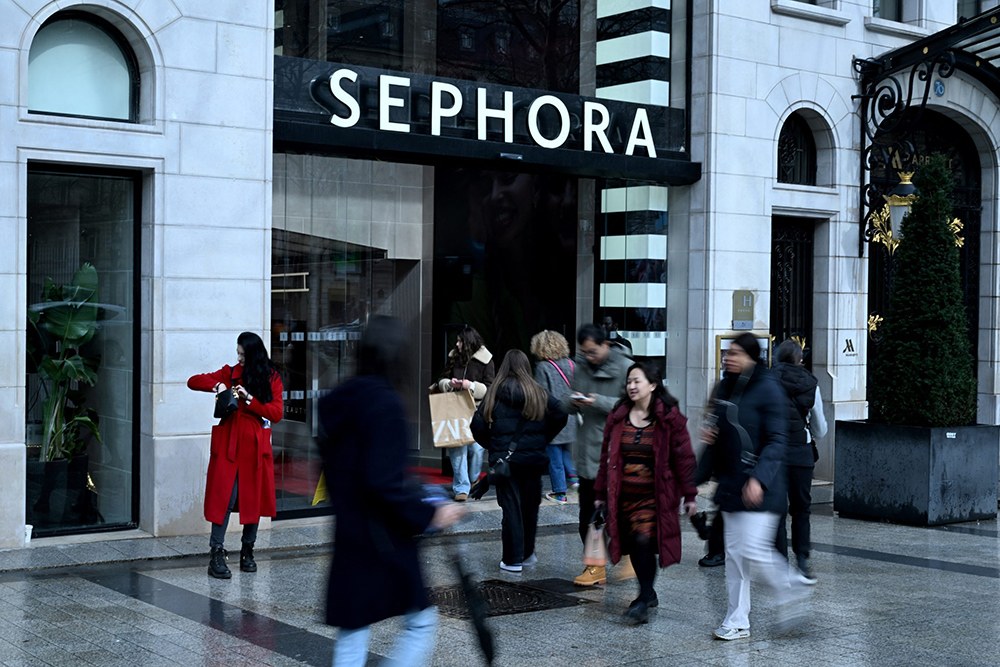
從表面上看,英荷合資的聯(lián)合利華公司(Unilever)和法國路威酩軒集團可能沒有太多共同之處,。聯(lián)合利華生產多芬(Dove)香皂和Axe除臭劑,,而路威酩軒集團則擁有路易威登(Louis Vuitton)和迪奧(Christian Dior)等高端奢侈品品牌。
但只要看一下它們的收入,,就會發(fā)現(xiàn)一個共同點——美容產品已被證明是它們最近取得成功的秘訣,,即使經濟挑戰(zhàn)使這兩家公司的其他業(yè)務受到拖累。
以聯(lián)合利華為例,。這家在倫敦上市的巨頭周四發(fā)布了第一季度財報,,銷售額同比增長4.4%,高于預期,。
增長最快的業(yè)務是什么,?美容與健康,占該品牌營業(yè)額的五分之一,,包括Tatcha,、多芬、Hourglass等品牌,。該公司本季度的銷售額增長了7.4%,,遠高于包括營養(yǎng)和家庭護理在內的其他細分市場。
聯(lián)合利華指出,,價格上漲對增長起到了一定作用,,但與個人護理產品相比,價格上漲起到的作用較小,。
另一方面,,路威酩軒在規(guī)模,、范圍和產品種類上都要大得多。這家由貝爾納·阿爾諾(Bernard Arnault)經營的企業(yè)集團為世界上最富有的人生產香水,、皮包和香檳,,但它也擁有一家吸引普通消費者的知名連鎖店——絲芙蘭。
路威酩軒集團于1997年收購了這家美容用品零售商,,事實證明,,在奢侈品行業(yè)注定要遭受重創(chuàng)的時期,這家美容用品零售商是這家法國集團的一大亮點,。2023 年,,隨著絲芙蘭在全球擴張并在英國重新上市后,其業(yè)績達到了歷史最佳水平,。
在路威酩軒集團今年3月發(fā)布的年度報告中,,這家奢侈品巨頭指出,,增長來自化妝品,、護發(fā)和護膚品。絲芙蘭在包括免稅店在內的精選零售細分市場推動利潤增長76%,,去年的銷售額達到179億歐元(約合194億美元),。
這一趨勢一直持續(xù)到2024年第一季度,與其他高端集團相比,,路威酩軒集團的精選零售細分市場增長最快,,漲幅達到11%。
路威酩軒集團在上周的財報中表示:“絲芙蘭再次實現(xiàn)了顯著增長,,持續(xù)擴大市場份額,。”
僅僅是“口紅效應”,,還是更多,?
美容產品往往能挺過艱難時期。專家們注意到,,在過去的經濟衰退時期,,人們會在大額支出上削減開支,但在小額用品上大肆揮霍,,這種現(xiàn)象被稱為“口紅效應”,。
這就解釋了為什么在生活成本和通貨膨脹居高不下的情況下,美容產品受到購物者的青睞,。
絲芙蘭的首席執(zhí)行官甚至承認,,口紅效應以及公司在店內體驗方面的創(chuàng)新,都對銷售起到了支撐作用,。
首席執(zhí)行官紀堯姆·莫特(Guillaume Motte)上月對英國《金融時報》表示:“我們有一款易得到且讓人開心的產品,。我們會經歷爆炸性增長嗎,?答案是否定的。我會擔心嗎,?答案也是否定的,。”
但是,,除了美容產品是一種讓人有負罪感的享受之外,,還有更多的故事。
最近幾個月,,其他化妝品品牌也表現(xiàn)強勁,,無論是擁有夏洛特·蒂爾伯里(Charlotte Tilbury)的西班牙普伊格公司(Puig)正尋求上市(估值高達139億歐元(149億美元)),還是歐萊雅(L’Oréal)在歐洲和北美的銷售增長,。麥肯錫(McKinsey)的數據顯示,,到2027年,整個美容行業(yè)的價值預計將達到5800億美元,,而且增長速度將超過服裝和鞋類,。
消費者也日益意識到,平價品牌和高端品牌在整體外觀上不相上下,,這意味著精打細算的買家可以花更少的錢買到產品,。
這是否意味著這些美容和健康公司已經脫離了困境?也許并非如此,。對于聯(lián)合利華來說,,它的部分業(yè)務,比如冰淇淋業(yè)務,,仍前途未卜,。路威酩軒集團的銷售仍然主要依賴于時裝和皮革制品。
但與此同時,,何不從美容品牌超越其他品牌中獲益呢,?(財富中文網)
譯者:中慧言-王芳
從表面上看,英荷合資的聯(lián)合利華公司(Unilever)和法國路威酩軒集團可能沒有太多共同之處,。聯(lián)合利華生產多芬(Dove)香皂和Axe除臭劑,,而路威酩軒集團則擁有路易威登(Louis Vuitton)和迪奧(Christian Dior)等高端奢侈品品牌。
但只要看一下它們的收入,,就會發(fā)現(xiàn)一個共同點——美容產品已被證明是它們最近取得成功的秘訣,,即使經濟挑戰(zhàn)使這兩家公司的其他業(yè)務受到拖累。
以聯(lián)合利華為例,。這家在倫敦上市的巨頭周四發(fā)布了第一季度財報,,銷售額同比增長4.4%,高于預期。
增長最快的業(yè)務是什么,?美容與健康,,占該品牌營業(yè)額的五分之一,包括Tatcha,、多芬,、Hourglass等品牌。該公司本季度的銷售額增長了7.4%,,遠高于包括營養(yǎng)和家庭護理在內的其他細分市場,。
聯(lián)合利華指出,價格上漲對增長起到了一定作用,,但與個人護理產品相比,,價格上漲起到的作用較小。
另一方面,,路威酩軒在規(guī)模,、范圍和產品種類上都要大得多。這家由貝爾納·阿爾諾(Bernard Arnault)經營的企業(yè)集團為世界上最富有的人生產香水,、皮包和香檳,,但它也擁有一家吸引普通消費者的知名連鎖店——絲芙蘭。
路威酩軒集團于1997年收購了這家美容用品零售商,,事實證明,,在奢侈品行業(yè)注定要遭受重創(chuàng)的時期,,這家美容用品零售商是這家法國集團的一大亮點,。2023 年,隨著絲芙蘭在全球擴張并在英國重新上市后,,其業(yè)績達到了歷史最佳水平,。
在路威酩軒集團今年3月發(fā)布的年度報告中,這家奢侈品巨頭指出,,增長來自化妝品,、護發(fā)和護膚品。絲芙蘭在包括免稅店在內的精選零售細分市場推動利潤增長76%,,去年的銷售額達到179億歐元(約合194億美元),。
這一趨勢一直持續(xù)到2024年第一季度,與其他高端集團相比,,路威酩軒集團的精選零售細分市場增長最快,,漲幅達到11%。
路威酩軒集團在上周的財報中表示:“絲芙蘭再次實現(xiàn)了顯著增長,,持續(xù)擴大市場份額,。”
僅僅是“口紅效應”,還是更多,?
美容產品往往能挺過艱難時期,。專家們注意到,在過去的經濟衰退時期,,人們會在大額支出上削減開支,,但在小額用品上大肆揮霍,這種現(xiàn)象被稱為“口紅效應”,。
這就解釋了為什么在生活成本和通貨膨脹居高不下的情況下,,美容產品受到購物者的青睞。
絲芙蘭的首席執(zhí)行官甚至承認,,口紅效應以及公司在店內體驗方面的創(chuàng)新,,都對銷售起到了支撐作用。
首席執(zhí)行官紀堯姆·莫特(Guillaume Motte)上月對英國《金融時報》表示:“我們有一款易得到且讓人開心的產品,。我們會經歷爆炸性增長嗎,?答案是否定的。我會擔心嗎,?答案也是否定的,。”
但是,,除了美容產品是一種讓人有負罪感的享受之外,,還有更多的故事。
最近幾個月,,其他化妝品品牌也表現(xiàn)強勁,,無論是擁有夏洛特·蒂爾伯里(Charlotte Tilbury)的西班牙普伊格公司(Puig)正尋求上市(估值高達139億歐元(149億美元)),還是歐萊雅(L’Oréal)在歐洲和北美的銷售增長,。麥肯錫(McKinsey)的數據顯示,,到2027年,整個美容行業(yè)的價值預計將達到5800億美元,,而且增長速度將超過服裝和鞋類,。
消費者也日益意識到,平價品牌和高端品牌在整體外觀上不相上下,,這意味著精打細算的買家可以花更少的錢買到產品,。
這是否意味著這些美容和健康公司已經脫離了困境?也許并非如此,。對于聯(lián)合利華來說,,它的部分業(yè)務,比如冰淇淋業(yè)務,,仍前途未卜,。路威酩軒集團的銷售仍然主要依賴于時裝和皮革制品,。
但與此同時,何不從美容品牌超越其他品牌中獲益呢,?(財富中文網)
譯者:中慧言-王芳
On the surface, Anglo-Dutch Unilever and French LVMH might not have much in common. While Unilever makes Dove soap and Axe deodorant, LVMH owns high-end luxury labels like Louis Vuitton and Christian Dior.
But just one look at their earnings and a common thread emerges—beauty products have proved the secret to their recent success, even if economic challenges have pulled other parts of their businesses down.
Take Unilever, for instance. The London-listed behemoth released its first-quarter earnings on Thursday, clocking in higher sales growth than anticipated, of 4.4% compared with last year.
Its fastest-growing segment? Beauty and well-being. It contributes to a fifth of the brand’s turnover and includes brands like Tatcha, Dove, Hourglass, and more. Its sales growth for the quarter was 7.4%—well above any other segment including nutrition and home care.
Price increases had a part to play in the growth, but less so compared with personal care products, Unilever noted.
LVMH, on the other hand, is a far bigger company in size, scope, and variety of products. The Bernard Arnault–run conglomerate makes perfume, leather bags, and Champagne for the world’s most affluent, but it also owns a well-known chain that appeals to the average shopper—Sephora.
The beauty retailer, which LVMH bought in 1997, has proved a big bright spot for the French group amid an otherwise doomed period for the luxury industry. Sephora had its best-ever performance in 2023 as it expanded globally and relaunched in the U.K.
In LVMH’s annual report released in March, the luxury behemoth noted that the growth came from makeup, hair care, and skin care. Sephora helped drive a 76% profit rise in the selective retailing segment, which includes duty-free shops, and raked in €17.9 billion ($19.4 billion) in sales last year.
That trend continued into the first quarter of 2024, as LVMH’s selective retailing segment grew the most—by 11%—compared with other premium groups.
“Sephora once again achieved remarkable growth, continuing to gain market share,” LVMH said in its earnings release last week.
Just the ‘lipstick effect,’ or more?
Beauty products tend to persist through trying times. Experts have noticed the phenomenon, dubbed the “l(fā)ipstick effect,” through past economic downturns as people look to trim costs on big expenses but splurge in small ways.
This explains why beauty products are popular among shoppers when the cost of living and inflation remain elevated.
Sephora’s CEO even agreed the lipstick effect had a hand in propping up its sales, along with the company’s innovations with in-store experiences.
“We have a product that makes people happy, an accessible product. Are we going to have explosive growth? The answer is no. Am I concerned? The answer is also no,” CEO Guillaume Motte told the Financial Times last month.
But there’s more to the story beyond beauty products being a guilty pleasure.
Other cosmetic brands have also seen a strong run in recent months—whether that’s Spain’s Puig, which owns Charlotte Tilbury, looking to go public with a market value of up to €13.9 billion ($14.9 billion), or L’Oréal’s sales boost across Europe and North America. By 2027, the overall beauty industry is expected to be worth $580 billion—and achieved at a faster pace than apparel or footwear, according to McKinsey.
There’s also a growing realization among shoppers that affordable and premium brands are comparable in their overall look, which means a smaller wallet spend for the budget-conscious buyer.
Does that mean these beauty and wellness companies are out of the woods? Probably not. For Unilever, there are still parts of its business, like its ice cream segment, with an uncertain future. And LVMH’s sales still hinge heavily on fashion and leather products.
But in the meantime, why not reap the benefits of beauty brands outshining the rest?






